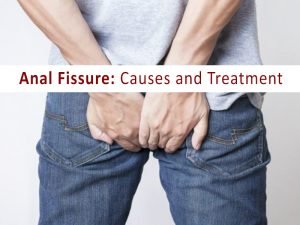Anal Fissure: Causes and Treatment
Description of anal fissure:
An anal fissure is a tear or rip that develops in the lining of the anus. The tear may extend into the internal sphincter (a circular ring of smooth muscle). When an anal fissure forms, the internal sphincter muscle goes into spasm which leads to more tears and limits blood flow to the area. Anal fissures occur in a tissue known as anoderm. Most anal fissures occur in the posterior midline of the anus; few occur in the anterior midline. Anal fissures cause severe pain while passing stools.
Anal fissures can occur in any age group. It usually heals within a few days or weeks but if it does not recuperate after 6 weeks, it is considered a chronic fissure where medical attention is required.
The pressure in the anal sphincters that control the anus may be the cause of fissures. Anal fissure causes include constipation, straining during a bowel movement, hard stool, childbirth, inflammatory bowel diseases, chronic diarrhea, long-standing misuse/overuse of laxatives, and anal sex. The less common causes: HIV, syphilis, tuberculosis, herpes, and anal cancer.
Healing solutions for anal fissure:
There are various modalities for anal fissure treatment such as home remedies, medications, and surgery.
Home remedies:
- A healthy diet and adequate fiber intake in diet.
- Try fiber supplements.
- Adequate fluid intake to stay hydrated and to prevent constipation.
- Avoid fatty and oily food.
- Regular physical activity.
- Do not strain during defecation.
- Warm sitz baths for about 15 to 20 minutes per day, 2 or 3 times per day (especially after defecation)to relax the spasm , to increase blood circulation and to help reduce inflammation and infection
- Do not suppress the urge to defecate.
- Do not spend too much time sitting in the toilet.
- Proper cleaning of the area.
- Use water to clean and avoid scented soaps/toilet paper.
Medication:
- Over-the-counter bulk forming laxatives and stool softeners.
- Topical anesthetic creams/ointments such as lidocaine hydrochloride to relieve the pain. These however are only temporarily solutions. It may sometimes lead to chronicity if followed without instructions of a proctologist.
- Steroids: Sometimes used in combination with topical anesthetics to decrease inflammation but there are chances of secondary infection and hence not preferred.
- Nitroglycerin: applied externally for healing and to increase blood circulation to the fissure and to relax the anal sphincter. (Unpredictable and not promising results)
- Botulinum toxin type A (Botox) injection: to relax the muscle spasms.(results unpredictable and presently not used)
- Blood pressure medications as per medical advice.
Surgical Treatment:
In severe cases or cases non-respondent to conservative treatment, surgical intervention is required.
- Lateral Internal Sphincterotomy: A procedure performed under anesthesia where a small part of the anal sphincter muscle is removed to decrease the muscle spasm, tension, and pain and also, to help in healing. It also improves blood circulation in the perianal area. It has a risk of incontinence. This procedure is successful in more than 95% of patients.
- Fissurectomy: A procedure that removes the affected skin around the anal fissure and any skin tags. This procedure is done with Botox injections.
- Anal advancement flap: A procedure involved in removing a piece of tissue from another part of the body and using it to heal the fissure.
- Anal dilation: A procedure under anesthesia where the anal canal is dilated manually. It is also known as Lord’s anal dilatation.
- Pneumatic balloon dilation: Used for chronic anal fissures.
Special Ayurvedic treatments:
- Natural bulk forming laxatives and stool softeners like Proctobulk powder.
- Medicated oil or ghritams as small animas to relax the sphincter-like Topical Proctorelax.
- Sitz bath in warm water with Proctobath liquid added to it.
- Ayurvedic Kshar Karma
- Ksharsutra ligation
If you are looking for anal fissure treatment, find the best proctologist at Shreyas Ano Rectal Hospital and Research Center (www.proctocure.com) to receive the best fissure treatment in India.





Leave A Comment